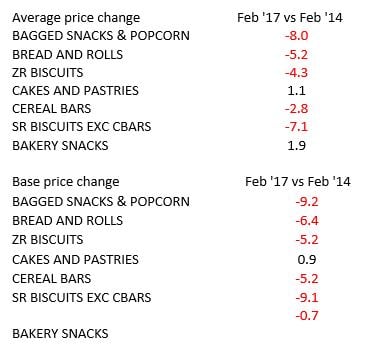Contradicting the widespread concern that Brexit might cause an increase in costs of goods for manufacturers, a recently published three-year IRI study showed many retail products had actually decreased.
The price decrease on groceries has also saved UK shoppers approximately £9.3bn ($12.04bn) over the past three years.
“[The study] reveals that, while average prices have risen by 1% in the last year, the increase is almost entirely due to a decreased use of trade promotion,” said IRI.
“There were 12% fewer promotions in 2016 as multi-buys, such as three for the price of two deals, disappeared and the level of discount offered by promotions reduced.
“Manufacturers and retailers have opted, where possible, to reduce promotional savings instead of increasing everyday base prices.”
Bakery, snacks price decline
IRI data showed that, among major UK retailers, the base price of bagged snacks and popcorn declined 9.2% during the three-year period, while bread and rolls, and biscuits declined by 6.4% and 5.2% respectively.

Additionally, cereal bars and bakery snacks declined by 5.2% and 0.7% respectively.
The only bakery segment that saw a base price increase was cakes and pastries (0.9%).
In terms of average price change, all the bakery segments in UK retail experienced a decline over the period, except for cakes and pastries (1.1%), and bakery snacks (1.9%).
The base price refers to a product’s original price before discount, and the average price is a combination of the discounted price and the original price, explained Eales.
Retail growth has been slow, he said, and that is putting “immense pressure” on the food manufacturers to maintain a decent profit margin and keep traffic coming through their stores.
“That’s why [manufacturers] have been reducing prices in order to try to close the gap between what shoppers spend in their stores rather than in other retailers,” he said.
Private label pricing increase
IRI said, even through manufacturers are caught up in the retailer price war, it has not stopped them from increasing the price of their private label ranges.
In fact, retailers’ own label pricing is rising faster than brands as retailers have started managing their own rising costs.
“This is the first time that own label prices have risen year-on-year for three years,” IRI said. “Grocery own label base prices were the same in February 2017 as they were in February 2016, but started rising in November when branded base prices were still going down.”
In other words, retailers are increasing the pricing of their labels to offset the financial loss due to brand’s prices decrease.
However, Eales said it is an “enormous generalization” to say private label products are cheaper than branded items, since private label usually covers the whole spectrum of prices.
“But, if you combine all private label prices, it shows there’s a gap between private labels and brands somewhere around 30%,” Eales said. “If you’re a brand buyer, and suddenly switch to buying equivalent private label, you would save around 30% of your shopping bill.
“So, it makes sense for retailers to increase their own label prices [to make a profit],” he added.
Price increase due to sugar reduction
While UK shoppers are still able to save money as long as they strategically plan their grocery shopping - whether from discounted offerings or switching to cheaper private labels - Eales said price increases may be “inevitable” due to the current health and wellness trend.
“What’s going to affect bakery manufacturers, particularly cakes and pastries, is the sugar reduction agenda from the UK’s public health sector,” he said.
The UK government mapped out its sugar reduction plan last year to fight against childhood obesity. It requires all sectors of the food and drinks industry to reduce sugar content by 20% by 2020.
“That will require a reformulation of some products, and a shrinking on pack sizes on others,” Eales said.
